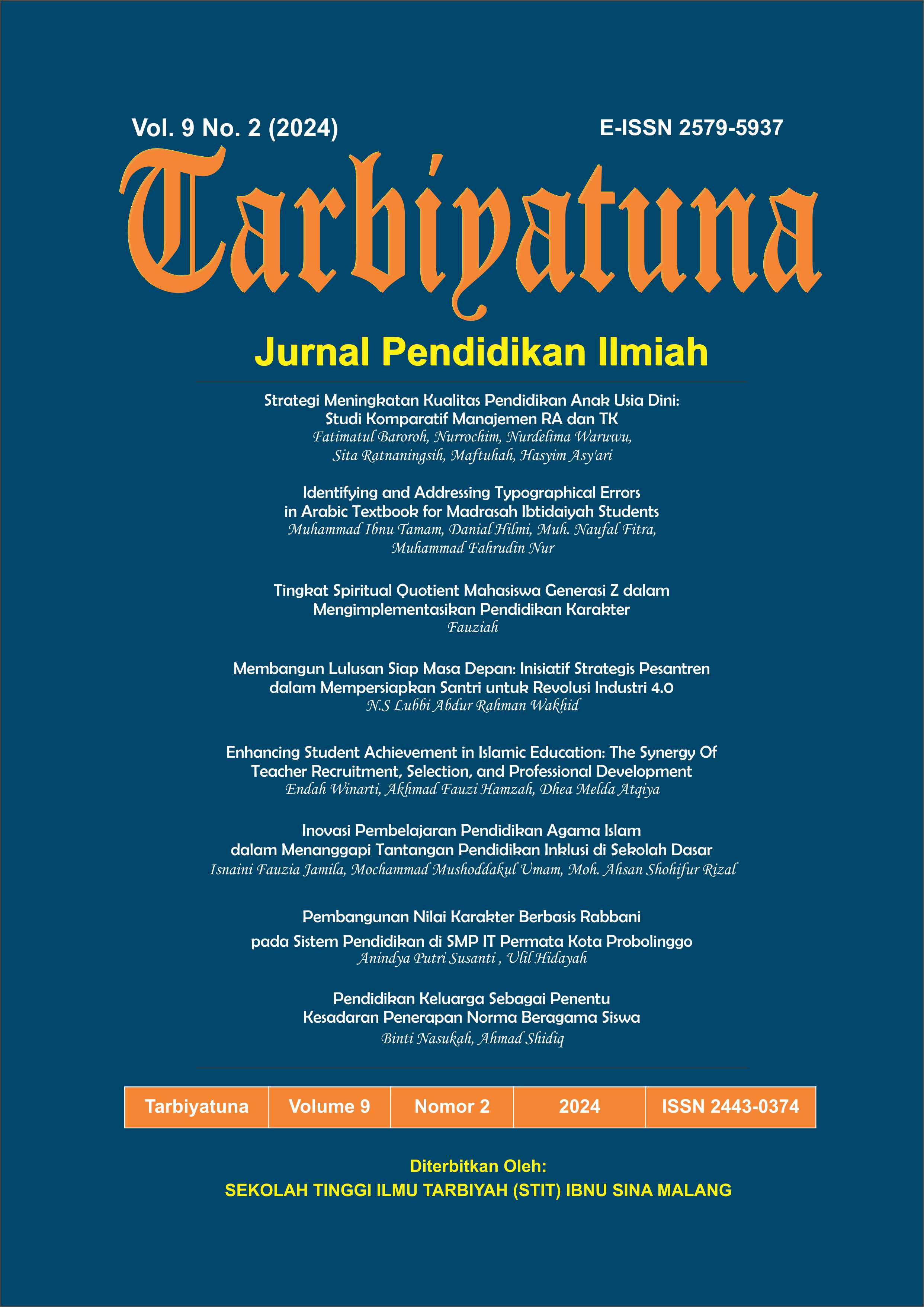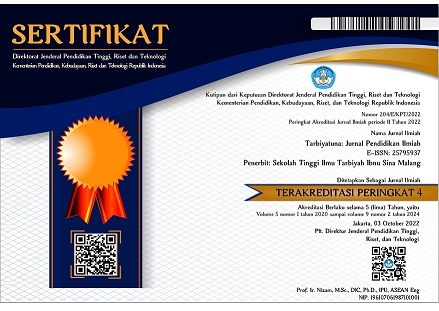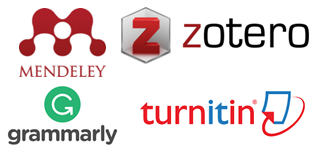Tingkat Spiritual Quotient Mahasiswa Generasi Z dalam Mengimplementasikan Pendidikan Karakter
Abstract
The heterogeneity of generation Z students in Malang Raya forms a varied attitude so that the level of spiritual quotient experiences serious things that must be considered. In fact, this intelligence will shape the direction of character education in accordance with the values contained therein. In this regard, the purpose of this study is to analyze the level of spiritual quotient and its orientation towards character education of Malang Raya students. The approach used in this study is a quantitative approach with a survey research type at four PTKI in Malang Raya. Data were obtained from the results of distributing questionnaires and tests on spiritual quotient. The results of the study showed that the level of spiritual quotient of Malang Raya students was: 32% high, 62% moderate, 6% low with a mean of 85.07 which means that the level of spiritual quotient of students is good, while the orientation of spiritual quotient towards character education is seen in the wisdom taken from every incident and disaster experienced, always keeping promises, trying to apologize and giving happiness to others. The findings of this study are that character education requires strengthening the spiritual quotient in students so that religious values can truly be applied internally and externally to the self and mentality of each student.
References
Fitriyani, P. (2018). Pendidikan Karakter Bagi Generasi Z. Jakarta: Prosiding Konferensi Nasional Ke- 7 Asosiasi Program Pascasarjana Perguruan Tinggi Muhammadiyah, Aisyiyah (APPPTMA), 307-314
Agustian, A. G. (2001). Rahasia Sukses Membangun Kecerdasan Emosi dan Spiritual ESQ. Jakarta: Arga
Fauziatun, N. & Misbah, M. (2020). Relevansi Kecerdasan Emosional (EQ) dan Kecerdasan Spiritual (SQ) dengan Pendidikan Karakter. Jurnal Kependidikan, 8(2), 142-165. https://doi.org/10.24090/jk.v8i2.5260
Ginting, M. C., & Silitonga, I. M. (2019). Pengaruh Pendanaan Dari Luar Perusahaan dan Modal Sendiri Terhadap Tingkat Profitabilitas Pada Perusahaan Property and Real Estate Yang Terdaftar di Bursa Efek Indonesia. Jurnal Manajemen, 5(2), 195-204.
Harimulyo, M. S et al. (2021). Nilai-Nilai Pendidikan Akhlak Dalam Kitab Risalatul Mu’awanah Dan Relevansinya. Jurnal Penelitian Ipteks, 6 (1) Januari 2021, 72-89. https://doi.org/10.32528/ipteks.v6i1.5253
Juwita, D. R. (2018). Pendidikan Akhlak Anak Usia Dini Di Era Millennial. At-Tajdid : Jurnal Ilmu Tarbiyah, 7(2), 282–314
Lestari, I., & Handayani, N. (2023). Pentingnya Pendidikan Karakter Pada Anak Sekolah Khususnya SMA/SMK di Zaman Serba Digital. Jurnal Guru Pencerah Semesta, 1(2), 101-109. https://doi.org/10.56983/gps.v1i2.606
Nggermanto, A. (2002). Quantum Quotient Kecerdasan Quantum: cara praktis melejitkan IQ, EQ, dan SQ yang harmonis. Bandung: Yayasan Nuansa Cendekia
Prasetiya, B., Safitri, M. M., & Yulianti, A. (2019). Perilaku Religiusitas: Analisis Terhadap Konstribusi Kecerdasan Emosional Dan Spiritual. Al-Tadzkiyyah: Jurnal Pendidikan Islam, 10(2), 303–312. https://doi.org/10.24042/atjpi.v10i2.5015
Putri, D. P. (2018). Pendidikan Karakter Pada Anak Sekolah Dasar di Era Digital. Ar-Riayah: Jurnal Pendidikan Dasar, 2(1), 38-48. https://doi.org/10.29240/jpd.v2i1.439
Said, A. N. (2018). Pengaruh Kecerdasan Intelektual, Kecerdasan Emosional Dan Kecerdasan Spiritual Terhadap Sikap Etis Mahasiswa Akuntansi (Studi Empiris Pada Mahasiswa Prodi Akuntansi Universitas Negeri Yogyakarta). Jurnal Nominal, Volume Vii Nomor 1.
Shofwan, A. M. (2021). Character Building: Optimalisasi Pendidikan Karakter pada Anak Usia Dini. Sukabumi: Farha Pustaka
Sudrajat, A. (2011). Mengapa Pendidikan Karakter?. Jurnal Pendidikan Karakter, 1(1), 47-58. https://doi. Org/10.21831/jpk.v1i1.1316
Ummah, K. (2003). SEPIA: Kecerdasan Milyuner, Warisan Yang Mencerahkan bagi Keturunan Anda. Bandung: Ahaa
Wahib, A. (2021). Integrasi Pendidikan Karakter Berbasis Intelectual, Emotional and Spiritual quotient Dalam Bingkai Pendidikan Islam. Tadris: Jurnal Pendidikan Islam, 16(2), 479-495. https://doi.org/10.19105/tjpi.v16i2.4758








.png)

